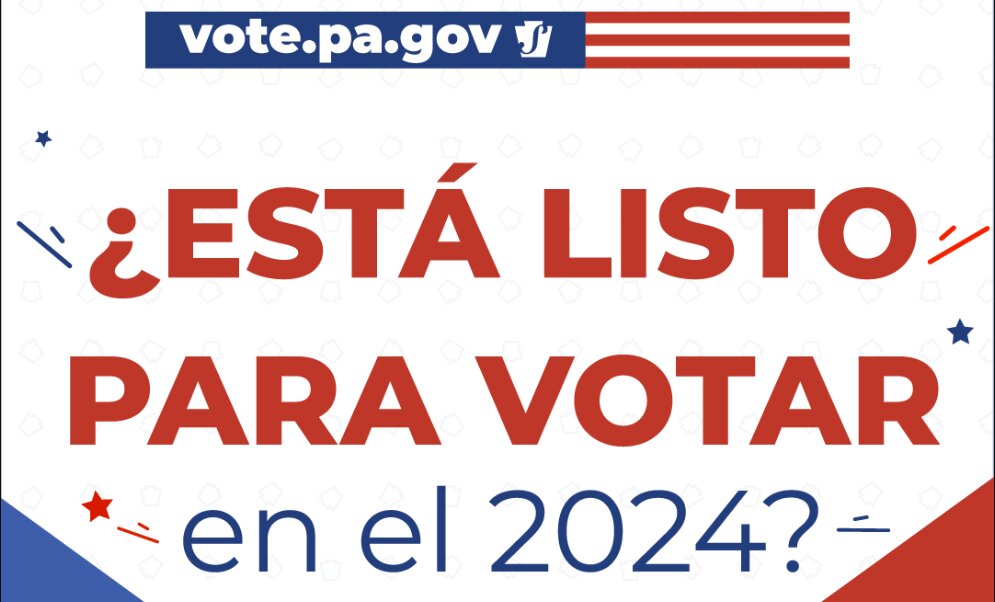With Pennsylvania’s April 23 presidential primary approaching, Pennsylvania election officials launched a voter education campaign on Thursday to ensure residents are aware of crucial deadlines and immunized against misinformation.
“We know there will be plenty of misinformation and disinformation … that our voters will encounter in the days and months ahead,” Pennsylvania Secretary of State Al Schmidt told the Capital-Star on Wednesday. “We want to make sure that we make resources available to them, to make sure that our non-political partners are distributing information we’ve prepared.”
This year’s primary is unusual, because in addition to being about a month earlier than non-presidential years, it coincides with a major Jewish holiday.
During Passover, celebrated from April 22-30, those who observe spend time with family during Seder meals and some refrain from driving, writing or using electronic devices.
“That is a concern for some voters, whether they have religious obligations or family obligations, to make sure that they know that voting by mail is available to them,” Schmidt said.
Additionally, Schmidt said, election workers who celebrate Passover and will not be available for the primary election should notify county officials so that vacancies can be filled. Election officials may also need to find alternative polling places if synagogues and Jewish community centers are not available.
The Department of State initiative highlights key dates and deadlines for the election:
- April 8 is the last day to register to vote in the primary election
- April 16 is the last day to apply for a mail ballot
- April 23 is Election Day, when polls are open from 7 a.m. to 8 p.m.
- Mail ballots must be received by your county elections office by 8 p.m. on April 23.
The department has published a voter education tool kit with posters, flyers, and graphics for printed materials and social media in English, Spanish, and Chinese that organizations can use to build public confidence in elections and educate voters about the primary.
Mail-in ballot materials have also been redesigned to eliminate confusion over the requirement to sign and date the return envelope.
“It is awful to see that voters sign it and write their birthday and when you do a little research it’s primarily older and elderly voters who have made that mistake in the past,” Schmidt said.
READ: Increase in Ballot Errors Coincides with Turnover Among County Election Officials in Pennsylvania
Pennsylvania courts decisively ruled that mail-in ballots that are not signed must be rejected. Ballots returned with an incorrect or missing date have been subject to challenges in a series of court cases.
Although a federal judge ruled in November that ballots with missing or incorrect dates must be counted under federal law, the Republican Party is appealing the decision. Schmidt said the Shapiro administration’s position is that such ballots should be counted.
The litigation over the requirement revealed that no counties actually check the date and instead stamp ballots with the time and date when they are received, Schmidt noted.
“The courts found that that was a requirement that really had no bearing on whether that ballot was returned in time or not, or whether that voter was eligible to cast it or not, and ruled that should not be a factor in disqualifying a ballot from being counted,” Schmidt said.
Schmidt said challenges surrounding mail-in ballots remain. In particular, Pennsylvania law does not allow election offices to begin to prepare to count ballots until polls open on election day. In recent elections, that has led to delays in decisive election results as election workers count mail ballots into the wee hours of the next day.
An effort to change the law last year failed, which Schmidt said was disappointing and frustrating.
“Even states like Florida allow the mail-in ballot declaration envelope and all the rest to be processed, even if they don’t count a single vote before 7 a.m. on election morning. There’s a lot of work that goes into the front end of that,” he said.
When voters have grown accustomed to knowing the results of an election within hours of the polls closing, delays in reporting decisive results creates opportunities for mischief and sowing mistrust in election integrity, Schmidt said.
On the upside, county election offices have become more adept at swiftly counting vote-by-mail ballots and the number of mail ballots cast has declined since the height of the pandemic.
Schmidt said Gov. Josh Shapiro’s executive order to require automatic voter registration when applying for a driver’s license or state ID card is another example of the administration’s commitment to ensuring that every eligible resident can vote and that every vote is counted.
The order resulted in an increase of about 44% in new voters registering over the same period last year, he said.
“Launching this voter education initiative now, I think, is an indication of how much work there is to do to make sure that voters are aware, to make sure that voters know when the deadlines are, and nothing gets in the way of our eligible voters casting their votes and having them counted,” Schmidt said.
Pennsylvania Capital-Star is part of States Newsroom, a network of news bureaus supported by grants and a coalition of donors as a 501c(3) public charity. Pennsylvania Capital-Star maintains editorial independence. Contact Editor John Micek for questions: info@penncapital-star.com. Follow Pennsylvania Capital-Star on Facebook and Twitter.






